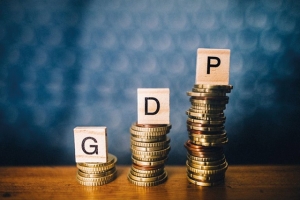GDP Ingredients – Drivers of Growth
Op-Ed
What is politics? Somebody might hurry to give me a classic triviality of an answer, that politics is the art of the possible, or, more facetiously, the art of looking for trouble. My favorite answer is that politics is the human desire and attempt of a politician to force the electorate into liking him or her. Conversely, the economy could be given a friendlier definition: it is a chance to be happy, sated, clad and well groomed. Only that chance is both slippery and elusive: one needs to grab it real hard and hold on until it yields into something tangible so that the grabber feels that survival has taken place.
In Georgia, most politicians are unlikable, but doers of economy are in favor; politicians get on people’s nerves, but economically-minded folks emanate hope of welfare; politicians use words to make a difference, whereas economists utilize specific resources to improve our lifestyle. And still, both politics and economy want to go hand in hand to come to each other’s rescue, and together, help us live better.
In this felicitous interaction, economy is certainly a key factor, although politics wants to be a leader, especially in a country like Georgia, scrambling over rough and steep politeconomical terrain in the last 30 years, not even having been able to obtain an optimal system for electing the right people at the right time to manage the country, both politically and economically.
I tend to believe that our economists have always known well that the economy is pulled forward by the strong oxen of consumer, business, government and exports, yet Georgian politicians seem oblivious of those inevitable components of material progress. If we want to follow how the economy behaves in this country, we need to be watching carefully the patterns of performance of these types of spending.
The velocity of economics in general totally depends on the health of these four bullocks. Based on expert opinion, what the customers of various segments of economy, taken together, purchase throughout the year might constitute two-thirds of the market value of all the final goods and services produced in a definite period of time, labeled the Gross Domestic Product (GDP). Consumer spending, for its part, depends on the size of the family income as well as its overall wealth. Here is the logic of ‘living better’ in Georgia: if our buyer doesn’t spend money on goods and services, the economy will shrink, the shrinkage will curb the growth of wages and jobs, and if salaries are down and the volume of work in the job market withers, the consumer’s purchasing power will either stagnate or be nullified. Thus, serious consumer spending, if possible at all, must start somewhere at some point in Georgia and it has to be maintained for as long as the current economic status allows so that the regular market cycle is not destroyed, and wealth starts to be generated.
One might say that spending is out of the question if there is nothing to spend. Fair enough, but if we don’t spend the maximum of what we have, the extant market will never generate the potential of growth. There is also an interesting notion of ‘spending confidence’, the lack of which may have a huge negative effect on economic progress: an unconfident shopper is cancerous to the marketplace.
The second most important element of GDP is business investment, which is not the most flourishing and easily executed economic move in Georgia. Business spending typically comprises three segments: equipment, building and contents of the building, called inventory. The next component is government spending. The administrative purchases needed for managing the regime also constitute a very solid part of Gross Domestic Product, but not the pension and social security funds which may have an effect on GDP only if their beneficiaries want to spend their retirement financial facilities.
The final constituent of the country’s Gross Domestic Product is the export of products, which is what foreign consumers spend on products manufactured internally, and then send out of the country to fill the external markets. I understand that this is just the ABC of economics but reminding ourselves of those rudimentary rules can’t hurt, especially in the wake of signing the Association Agreement between the EU and Georgia.
By Nugzar B. Ruhadze
Image source: shortpedia.com











